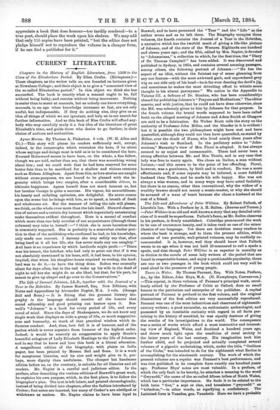Agnes Horan. By Thomas A. Pinkerton. 3 vols. (W. H.
Allen and Co.)—This story will please its readers sufficiently well, except, indeed, in the catastrophe which overtakes the hero, if he about whose sayings and doings most is told us is to be considered the hero. Everard Holmwood seems to have been, on the whole, a fine fellow, though we are told, rather than see, that there was something wrong about him ; and we could wish that he had been reserved for some better fate than to be sacrificed for a shallow and vicious creature such as Helena Allingham. Apart from this, as love-stories are naught without cross-purposes, we are bound to be pleased with the in- genuity which brings two couples, after a considerable detour, to ultimate happiness. Agnes herself does not much interest us, but her brother George is quite a success. His vigour, his unworldliness, his hearty and unfailing optimism, are delightful. He never comes upon the scene but he brings with him, so to speak, a breath of fresh and wholesome air. But the manner of telling the tale will please, we think, on the whole even more than the tale itself. Shrewd observa- tion of nature and a certain dry humour which is genuinely entertaining make themselves evident throughout. Here is a morsel of comfort which more than one lady novelist of our acquaintance (through these columns) may take to herself :—" I think she is more harmless than is commonly supposed. She is probably in a somewhat similar posi- tion to that of the archbishop who confessed he had, to his knowledge, only made one convert. I daresay she may safely say that, after being hard at it all her life, she has never made any one naughty." And here is an experience by which landlords might profit :—" There was his tenant, the butcher, who had only to point out that if it was not absolutely mentioned in his lease, still, it had been, in his opinion, implied, that when his slaughter-house required re-roofing, the land- lord was to do it,—to have the thing done. Bolton was unusually silent for days after, but in the end woke up his wife in the dead of night to tell her she might do as she liked, but that, for his part, he meant to give up chapel and go over to the Conservatives."


































 Previous page
Previous page